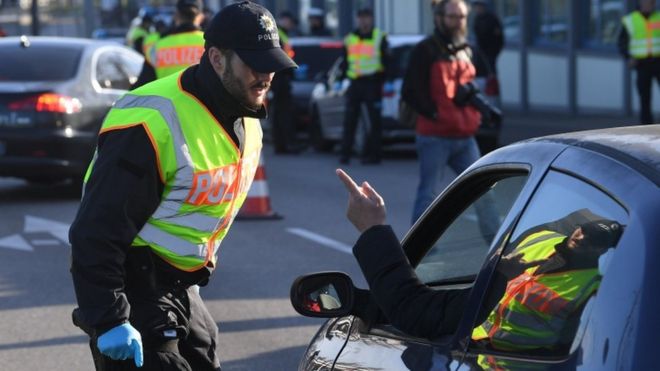Germany has become the latest country to close borders as European nations try to stem the spread of the coronavirus.
Its borders with France, Austria and Switzerland were shut on Monday, except for commercial traffic.
Spain will also close its borders later while France is considering more stringent lockdowns.
Meanwhile, the European Commission has proposed a temporary ban on non-essential travel to the European Union.
The measure would initially last for 30 days, and long-term residents in the EU, family members of EU nationals and diplomats would be exempt as well as cross-border and healthcare workers and people transporting goods.
The restriction must be approved by the 26 states that make up the borderless Schengen area. Non-Schengen members - including the UK - would be invited to take part.
There have been more than 174,000 confirmed cases of coronavirus and over 6,700 deaths, according to a tally from Johns Hopkins University.
Speaking in Geneva, the head of the World Health Organization (WHO), Dr Tedros Adhanom Ghebreyesus, said governments were not doing enough to combat the pandemic, and urged them to step up their testing programmes.
"You can't fight a fire blindfolded and we can't stop this pandemic if we don't know who is infected," he said. "We have a simple message for all countries: test, test, test."
To try to curb the economic turmoil, central banks around the world, including the US Federal Reserve and those in the UK, Japan, Canada, and Switzerland have cut interest rates and taken other measures.
But stock markets in Asia and Europe still fell and, on Wall St, trading was temporarily halted after the S&P 500 index dropped 8% on opening. It was the third time in six days that the session was interrupted.
The EU's Internal Market Commissioner Thierry Breton said a recession was now expected, with a 2-2.5% negative growth.
Airlines are also continuing to slash flights as demand slumps.
Germany had tried to resist closing its borders, to try to keep the Schengen agreement working, but traffic crossing the borders with the three neighbours and also Luxembourg will now be restricted to goods and people commuting for work.
The aim is to stem the spread of the virus but also to curtail cross-border panic-buying, German media reported. Only the borders with the Netherlands and Belgium are as yet unaffected.
Chancellor Angela Merkel announced a raft of other measures to limit social contact, including the closure of most non-grocery, cultural and entertainment venues. She also said people should cancel all domestic and foreign holiday travel.
Schools in Germany were closed on Monday and large gatherings nationwide had already been banned.
One of the most powerful German states, Bavaria, declared an emergency, closing all leisure facilities and restricting the activities of restaurants and cafes.
German tourism giant TUI said on Monday it was suspending most of its operations and asked for state aid.
Germany now has close to 5,000 confirmed cases of coronavirus, and 12 deaths.
Meanwhile, Foreign Minister Heiko Maas responded to reports that US President Donald Trump wanted to buy exclusive access to a potential vaccine developed by a German biotech firm, saying: "We cannot allow others to seek exclusive results."
What are the other restrictions in Europe?
Germany's neighbours such as Poland, the Czech Republic and Denmark have already closed borders or introduced severe restrictions.
But there are a vast amount of travel restrictions inside many countries.Spain will start controls at land borders and only Spanish citizens, residents and special cases will be allowed in the country. The measure will be introduced at midnight on Monday (23:00 GMT).
The Spanish government imposed a partial lockdown on its 47 million inhabitants on Saturday, as part of a 15-day state of emergency. People are barred from leaving home except for buying essential supplies and medicines, or for work.
Italy, the worst-affected nation outside China, where the virus originated, has more than 20,000 cases and more than 1,800 deaths.
Prime Minister Guiseppe Conte told the Corriere della Sera newspaper on Monday that damage from the virus would be "serious and widespread", adding: "A true 'reconstruction plan' will be needed.
"After the coronavirus, nothing will be as before, we will have to sit down and rewrite the rules of trade and the free market," he said.
France is considering following the lead of Italy and Spain and ordering people to remain in their houses. Cafes, restaurants, cinemas and most shops are already shut.
President Emmanuel Macron - who criticised the countries who were taking unilateral border control measures - will address the nation at 19:00 GMT.
On Monday, the head of the country's health service, Jerome Salomon, said the outbreak was "very worrying" and "deteriorating very fast".
France so far has more than 5,000 infections and 127 deaths.
Last week the WHO said Europe was now the "epicentre" of the virus and urged governments to act aggressively to control the spread of Covid-19, the disease caused by the coronavirus.
Dr Tedros also urged other countries to follow the containment strategies used in China and South Korea, saying they showed the pandemic was controllable.
Credit:BBC





